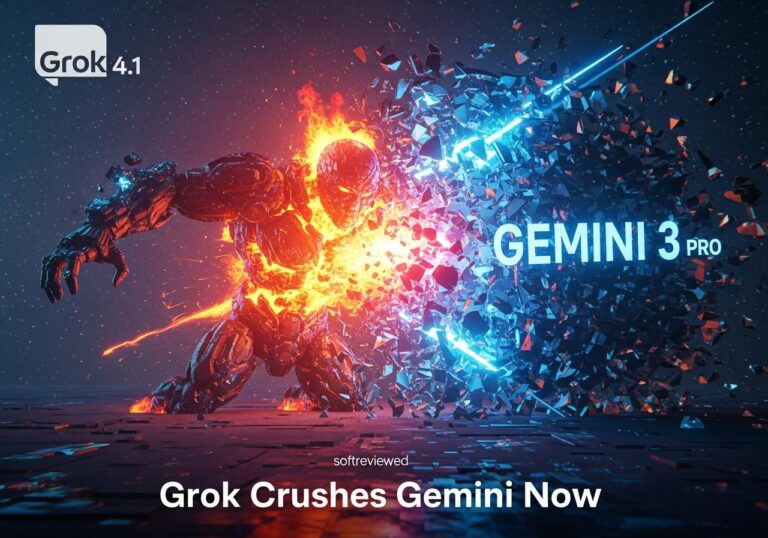🎙️ Advanced Voice Synthesis Features
Revolutionary capabilities transforming text-to-speech technology with human-like expression and global accessibility.
Advanced Emotional Control via Context-Specific Audio Tags
Directly manipulate tone, emotion, and non-verbal reactions using inline tags like [whispers], [sighs], [sad], and [laughs] for precise voice modulation.
Multi-Speaker Dialogue Mode for Authentic Conversations
Simulate natural interactions with seamless voice switching, pacing, and interruptions between characters for realistic dialogue experiences.
Support for 70+ Global Languages
Enables multilingual voice synthesis for worldwide accessibility in media, audiobooks, and interactive applications across diverse markets.
Non-Verbal Reactions Integration
Incorporates sighs, laughs, and whispers to add emotional depth and real-world responsiveness to synthesized speech output.
Enhanced Text Semantics for Natural Prosody
Improved handling of stress, cadence, and expressivity from text input, delivering speech with human-like nuance and natural flow.
PVC Optimization Planned for Future Release
Current limitations for Professional Voice Clones (PVCs) with v3; Instant Voice Clones (IVCs) recommended temporarily until optimization is complete.
ElevenLabs v3 (Alpha) Arrives: AI Voices Get a Serious Upgrade in Emotion and Range
The world of artificial intelligence is constantly abuzz with breakthroughs, and the latest to capture widespread attention is the launch of ElevenLabs v3 (Alpha). This isn’t just another incremental update; it’s a significant step forward in AI voice generation, promising voices that are not only lifelike but also deeply expressive and capable of conveying a nuanced range of emotions across a staggering number of languages. If you’ve been waiting for AI voices that can truly perform, not just speak, then the arrival of ElevenLabs v3 is news you’ll want to tune into.
This new model aims to bridge the gap between synthetic speech and human-like vocal performance, equipping creators and developers with tools to produce audio that is more engaging, immersive, and accessible than ever before. We’ll explore what ElevenLabs v3 brings to the table, from its enhanced emotional intelligence via audio tags to its impressive multilingual support and new dialogue mode.
What’s All the Buzz About? Introducing ElevenLabs v3
For those new to the name, ElevenLabs has rapidly become a prominent figure in voice synthesis and AI audio technology. Their tools have empowered creators to generate high-quality speech for everything from audiobooks and video narration to character voices in games. But the ambition has always been grander: to create AI voices virtually indistinguishable from human speech, not just in clarity, but in emotion and intent.
More Than Just Words: The Quest for Expressive AI Speech
Previous text-to-speech (TTS) systems, even advanced ones, often struggled with true expressiveness. While audio quality might have been high, conveying subtle emotions, handling conversational interruptions naturally, or delivering lines with genuine feeling remained a challenge. According to ElevenLabs, their Multilingual v2 model saw adoption in professional film, game development, and education, but a consistent limitation was this very expressiveness. Users needed more exaggerated emotions, believable back-and-forth dialogue, and the subtle non-verbal cues that make speech feel alive.
ElevenLabs v3 was built from the ground up to tackle this very challenge. It’s designed to produce voices that can sigh, whisper, laugh, and react dynamically, making the generated speech feel genuinely responsive.
Under the Hood: What Makes ElevenLabs v3 Tick?
The magic behind ElevenLabs v3 lies in its completely new architecture. While the company keeps the deepest technical details proprietary, the focus has clearly been on enabling the model to achieve a deeper understanding of text semantics. This allows for more natural cadence, stress, and emotional intonation across various languages and contexts.
The alpha version, launched around June 3, 2024, is presented as a research preview. This means that while groundbreaking, it’s still in a phase of refinement, and users might need to experiment more with “prompt engineering” – the art of crafting input text and cues – to achieve desired results.
From Monotone to Masterpiece: Key Innovations in ElevenLabs v3
So, what are the standout features that set ElevenLabs v3 apart? Let’s break down the core enhancements.
Speak My Language: Vastly Expanded Linguistic Capabilities 🌐
One of the most significant upgrades is the jump in language support. ElevenLabs v3 now supports over 70 languages, a substantial increase from the 29 supported by its v2 predecessor. This expansion aims to cover approximately 90% of the world’s population, dramatically increasing the global reach for creators looking to produce multilingual content. This is a massive step towards making high-quality synthetic speech universally accessible.
Feeling is Believing: Precision Emotional Control with Audio Tags 🎭
Perhaps the most exciting feature for creative applications is the introduction of audio tags. These are simple, inline commands (e.g., [whispers], [angry], [laughs], [sighs], [excited]) that users can embed directly within their script. These tags guide the AI’s performance, allowing for real-time control over tone, emotion, and even non-verbal reactions.
Imagine scripting a character to start a sentence with excitement, then trail off into a whisper, or to interject a laugh naturally within a phrase. ElevenLabs v3 aims to make this level of nuanced performance possible. The company even suggests users can prompt for sound prompts like [door creaks], though this likely refers to vocal imitations or sound-alike effects rather than full-blown sound effect generation (which ElevenLabs offers as a separate feature).
Let’s Talk: Crafting Natural Multi-Speaker Dialogues 🗣️
Creating convincing dialogue between multiple AI-generated voices has always been tricky. ElevenLabs v3 introduces a Dialogue Mode designed to handle multi-speaker conversations with more natural pacing, interruptions, and emotional transitions. The system can manage speaker turns, allowing for overlapping speech and the dynamic emotional shifts common in real human conversations. This could be a huge boon for audiobooks, radio plays, and game development where character interactions are key. The model reportedly supports up to 32 different speakers.
Deeper Text Understanding
Beyond specific features, the underlying architecture of ElevenLabs v3 is built for a more profound comprehension of text. This translates into better stress placement, more natural cadence, and enhanced expressivity derived directly from the input text, even before applying specific audio tags. This foundational improvement is crucial for achieving truly human-like speech.
Putting ElevenLabs v3 to the Test: Who Benefits Most?
While still in its alpha phase, ElevenLabs v3 is clearly targeted at users who demand a higher level of expressiveness and control over AI-generated voice.
🎬 For the Storytellers: Film, Gaming, and Audiobook Creators
These industries stand to gain immensely.
📌 Filmmakers can prototype voiceovers or even create final narrations with specific emotional tones.
📌 Game developers can generate dynamic and emotionally responsive dialogue for non-player characters (NPCs), making game worlds more immersive.
📌 Audiobook producers can craft richer listening experiences with distinct character voices and expressive narration.
The ability to direct the AI’s performance using audio tags is akin to directing a voice actor, offering unprecedented creative freedom.
🧑💻 For the Developers: Building the Next Wave of Voice Applications
Developers working on media tools, accessibility solutions, or interactive experiences can leverage ElevenLabs v3 to incorporate highly expressive speech. While a public API for v3 is “coming soon” (with early access available by contacting sales), the potential to integrate these advanced capabilities into custom applications is significant.
🌍 For Global Reach: Breaking Down Language Barriers
The expanded language support opens doors for content creators to reach wider audiences without the traditional costs and complexities of multilingual voice production. Educational materials, corporate training, and entertainment can all benefit from high-quality, emotionally resonant voiceovers in numerous languages.
How Does v3 Stack Up? A Quick Look at ElevenLabs’ Model Lineup
It’s important to understand where ElevenLabs v3 (Alpha) fits within the company’s existing offerings. For instance, ElevenLabs v2.5 Turbo and Flash models are optimized for low-latency, real-time applications.
Here’s a simplified comparison:
| Feature | ElevenLabs v3 (Alpha) | ElevenLabs v2.5 Turbo / Flash |
|---|---|---|
| Primary Use | Expressive storytelling, creative content | Real-time, conversational AI, low latency |
| Expressiveness | Highest, emotional control via tags | Good, but less nuanced |
| Languages | 70+ | Around 32 (Turbo v2.5) |
| Dialogue Mode | Yes, advanced multi-speaker | Basic multi-speaker possible |
| Latency | Higher (not ideal for real-time yet) | Ultra-low (e.g., ~75ms for Flash v2.5) |
| Prompt Engineering | More required for optimal results | Less intensive |
| Current Status | Alpha (Research Preview) | Production-ready |
ElevenLabs explicitly recommends continuing to use v2.5 Turbo or Flash models for real-time and conversational scenarios while v3 is being further developed. A real-time version of v3 is reportedly in development.
Voices from the Field: What Experts Are Saying
The launch of a model with such ambitious claims naturally generates discussion.
The Vision Behind v3: Insights from ElevenLabs’ CEO
Mati Staniszewski, Co-Founder & CEO of ElevenLabs, has been vocal about the goals for v3. He stated, “Eleven v3 is the most expressive text-to-speech model ever—offering full control over emotions, delivery, and nonverbal cues. With audio tags, you can prompt it to whisper, laugh, change accents, or even sing. You can control the pacing, emotion, and style to match any script. And with our global mission, we are happy to extend the model with support for over 70 languages.”
Staniszewski also credited his co-founder Piotr Dabkowski and the research team, saying, “This release is the result of the vision and leadership of my co-founder Piotr and the incredible research team he’s built. Creating a good product is hard—creating an entirely new paradigm is almost impossible.”
Balancing Innovation with Responsibility: The Ethical Tightrope
With increasingly realistic AI voice generation and cloning capabilities, ethical considerations are paramount. The potential for misuse – creating deepfakes, spreading misinformation, or impersonation – is a serious concern that ElevenLabs and the wider AI community grapple with.
Aleksandra Pedraszewska, Head of Safety at ElevenLabs, has previously commented on the broader topic of AI ethics, suggesting that AI companies shouldn’t solve these problems in isolation. She emphasized the importance of adopting available safety solutions and working with external organizations and academic researchers who have a deep understanding of policy and ethics. While her comments were not specific to v3’s launch, they reflect the company’s ongoing awareness of these challenges. ElevenLabs has implemented safeguards for its voice cloning technology, such as requiring permission for cloning voices not your own, and it’s expected that similar diligence will apply to the use of v3.
Navigating the Alpha: Considerations for Early Adopters
If you’re eager to try ElevenLabs v3 (Alpha), which is available via the ElevenLabs website (and with an 80% discount on UI-based usage through June 2024!), keep a few things in mind. This alpha phase is an incredible opportunity to experiment with cutting-edge AI voice capabilities.
Ready to experience the future of AI voice? Try ElevenLabs v3 (Alpha) now and hear the difference!
📌 Prompt Engineering: The Art of Guiding v3
ElevenLabs notes that this alpha release “requires more prompt engineering than previous models.” This means users will need to be more thoughtful and iterative in how they craft their text inputs and use audio tags to achieve the desired vocal performance. Experimentation will be key. You can learn more from the official ElevenLabs v3 (Alpha) announcement and prompting guide.
📌 Real-Time Reality: Current Limitations and Alternatives
As mentioned, v3 in its current alpha state is not optimized for low-latency applications. If you need voices for live interactions, chatbots, or other real-time use cases, stick with models like ElevenLabs Turbo v2.5 or Flash v2.5 for now. A low-latency version of v3 is on the roadmap.
📌 Professional Voice Cloning (PVC) Considerations
The official announcement states that Professional Voice Clones (PVCs) are not yet fully optimized for ElevenLabs v3. This might result in lower clone quality compared to earlier models when using PVCs with v3. For projects needing high-fidelity clones with v3 features during this alpha phase, using an Instant Voice Clone (IVC) or a designed voice is recommended. PVC optimization for v3 is planned for the future.
Peering into the Soundscape: What’s Next for ElevenLabs and AI Voice?
The launch of ElevenLabs v3 (Alpha) is more than just a new product; it’s a statement about the direction of AI voice generation. The focus is clearly shifting from mere intelligibility to true emotional resonance and performance.
The Road Ahead for v3: From Alpha to Everywhere
ElevenLabs has indicated that v3 is a step in a larger technical roadmap. We can anticipate:
👉 Continuous optimization of model performance.
👉 Release of low-latency versions to support real-time applications.
👉 Further expansion of language support and scenario adaptability.
👉 Full API access and integration into their broader suite of tools, like the Studio.
The feedback gathered during this public alpha phase will undoubtedly play a crucial role in shaping the production version of v3.
The Broader Symphony of AI-Generated Audio
ElevenLabs v3 joins a growing suite of AI audio tools that are transforming content creation. From AI music generation to automated dubbing and now, highly expressive TTS, the barriers to producing professional-quality audio are rapidly diminishing. This opens up incredible opportunities for independent creators, small businesses, and large enterprises alike.
However, it also underscores the need for ongoing dialogue about ethical use, copyright, and the potential impact on human voice actors. Proactive measures, transparent policies, and robust detection mechanisms will be crucial as these technologies become more powerful and widespread.
The Final Word (For Now) on ElevenLabs v3
ElevenLabs v3 (Alpha) represents an exciting advancement in the quest for truly human-like AI voice generation. Its emphasis on emotional expressiveness, multilingual capabilities, and nuanced dialogue control sets a new benchmark for what creators can expect from text-to-speech technology.
While it’s still early days for this alpha version, the potential is undeniable. If ElevenLabs can deliver on the promise of v3, refining its capabilities and addressing its current limitations, it could significantly reshape how we create and interact with audio content across countless applications. The era of AI voices that can not only speak but also emote and perform seems to be well and truly dawning. 🚀 We’ll be listening closely to see how this technology evolves.
Don’t just read about it – hear the revolution in AI voice for yourself! Explore ElevenLabs v3 (Alpha) today and craft your own expressive audio!







